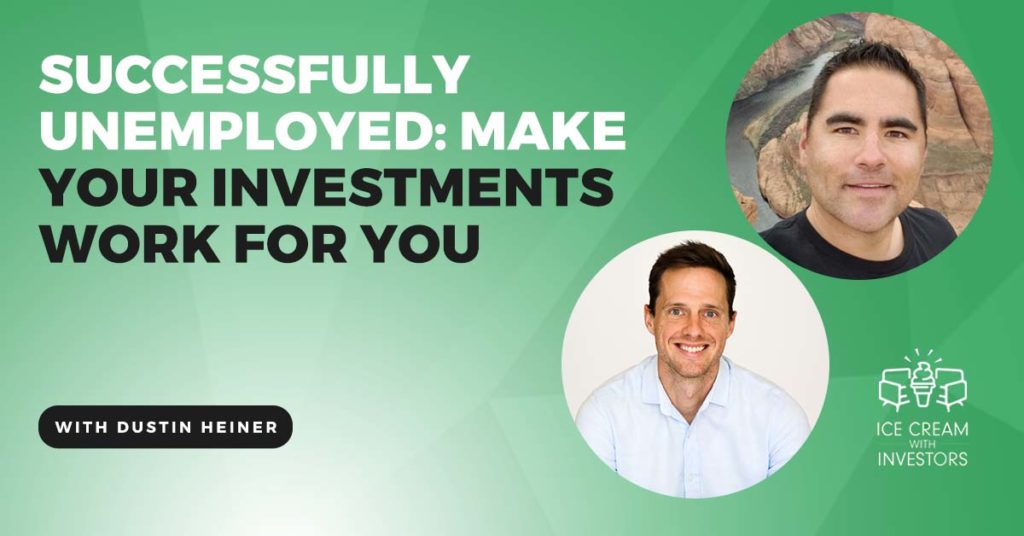Not everyone is lucky enough to land their dream job. Worse, not everyone is secure at their job, especially with the shifts in the economy. No matter how hard we work or how many late hours we put in, nobody is safe from “the cut.” In this episode, the Founder of Master Passive Income and Real Estate Wealth Builders Conference (REWBCON), Dustin Heiner, joins Matt Fore for a scoop topped with insights on being successfully unemployed. He shares tips on how to pick locations to invest in and how hiring the right expert can make or break your real estate business. Tune in and learn business strategies to make sure that you are ready and able to scale your portfolio and get more out of your investments. Don’t wait for the ax to fall. Start earning passive income today and be on your way to financial freedom!
Guest Links:
- https://www.masterpassiveincome.com/freecourse
- The Master Passive Income Podcast
- YouTube
- Text “Rental” to 33777 for Dustin’s free course
Guest Book Recommendations:
- How to Win Friends & Influence People By Dale Carnegie
- Rich Dad Poor Dad: What the Rich Teach Their Kids About Money That the Poor and Middle Class Do Not! By Robert T. Kiyosaki
- The Richest Man In Babylon By George S Clawson
—
Watch the episode here
Listen to the podcast here
Successfully Unemployed: Make Your Investments Work For You With Dustin Heiner
In this episode, we have Dustin Heiner. He is the Founder of the Master Passive Income and Real Estate Wealth Builders Conference. Most importantly, he is successfully unemployed. He is a real estate rental property investor who is able to make enough passive income from his business to quit his job at 37. With his podcast, YouTube channel, books, courses, and coaching, he now helps others quit their job by investing in real estate property to live their dream.
—
Dustin, welcome to the show.
Matt, Thank you, and I appreciate you for having me on. I love talking about real estate, what it comes down to and what real estate affords me to do in my life. How can I not work a job, go to the gym, and hang out with my family? Also, come on podcasts and talk to great people like you.
We like to start with the difficult questions here. What’s your favorite ice cream?
It’s vanilla bean. I love the flavor of vanilla. I know it’s very plain, but it wakes me up. It makes my mouth happy anytime. What’s also funny is I love chocolate too, but I don’t love chocolate ice cream. It’s too much, but I like milk chocolate candy.
With toppings or no toppings?
Toppings are great. I don’t mind toppings. In fact, if you put hot fudge on top of it, I’m in heaven.
Are you talking about McDonald’s hot fudge, or do you have a special place out in California that you’d like to go to?
I don’t have anything specific. Hershey’s syrup is okay. If I have to heat it up in order to put it on, I love that.
I just had some Chick-fil-A vanilla ice cream cone, so I’m into this. Tell our readers, what’s the scoop? What are you doing now?
Real estate investment can change your life where you can become financially independent.CLICK TO TWEET
I’m an investor. I invest in real estate. I love residentials of four units and below. I buy and hold them long-term and then rent them out. I was doing that back in 2006. I still am an investor, but I have so many people that want to learn how to do it. From there, I created Master Passive Income. That’s where I coach people and show people how to invest in real estate.
I have my podcast and YouTube channel. I do coaching, courses, books, and all that great stuff because I want to give all this great knowledge that I’ve accumulated to other people. I found that the more people I serve, the better my life gets. What I love to do now is to share that real estate investing can change your life where you can become financially independent.
Tell us, where did your real estate journey begin?
I’ll jump to the end, but then I’ll go back to the beginning. When I was 37 years old, I was blessed to be able to quit my job because I had enough long-term rental properties that basically made me money without working. When I was young growing up, I was following the plan that we’re all taught, which is you go to school and get good grades. You take those good grades, go to college, get in thousands of dollars into debt, and get good grades again. You then get a degree, a piece of paper they give you. You go around and try to get a job at a company and, hopefully, get a career.
You work in that career for 40-plus years, retire when you’re 65 years old or older, and hopefully retire on the money you managed to save the entire time that you’re working. I’m following that career path, and at the same time, I’ve always been entrepreneurial. I was starting businesses and that type of mindset. In starting businesses, I realized that I liked to start a business.
When I was thirteen years old, my first one was I had a newspaper route. You ride around on your bike with newspaper bags and newspapers in there. You throw the newspapers at 5:00 AM and bang garage doors, waking people up. I’ve also had a graphic and website design company. I’ve also had a skateboard manufacturing business, a convenience store, and a pizzeria. All started from the ground up, but at the same time, they weren’t terrific enough to where I didn’t have to work. I still had to make money for my family.
I also bought one rental property and realized, “I need to be an investor. If I bought one rental property, it would make me money without working. I need to do that over and over again.” Everything happens to everybody. Life gets in the way. I worked in a regular IT job at a local county government in California. In working that job, we started having children. I got to tell you the story. This is the story of what pushed me to where I must be an investor.
We had our fourth child, and as soon as my fourth child was born, I went on paternity leave from my technology job. It’s where the dad stays home with the mom, changes poopy diapers, bonds with the baby, and all that good stuff. I’m at home, and about two weeks later, I go back to work. That week that I get back to work on a Friday at 3:30 in the afternoon, I get a call from my boss’s boss’s boss’s secretary, the top dog. She says, “Dustin, would you please come to the office?” I said, “Sure.” I hung up the phone and I paused. I thought, “My goodness, why are they calling me to the office? This isn’t normal.”
I’ve seen plenty of movies. This is not a good sign. I also remembered a couple of months before I went on paternity leave, there were some rumors or some rumblings going on that there could potentially be layoffs because the department was running low on funds. I immediately shook it off. I said, “There’s no way. I’ve got plenty of seniorities here. I’ve been working here for a long time. My bosses think I do a great job. I get raises and everything.”
I got up and walked down the hallway to my boss’s office. This hallway isn’t very long, Matt. It’s short, but with every single step I take, it feels like the hallway gets longer and longer. It feels like my feet become lead bricks because the weight of everything I could potentially lose my job is starting to weigh down on me. I start to realize that. Now, I get down the hallway and I turn the corner. I see my boss’s door. His door is closed, and I see a secretary there, a super sweet and nice old lady. She’s looking at me sheepishly, grinning and trying to console me with her eyes. She says, “Dustin, would you please have a seat?”

Successfully Unemployed: Investing in real estate is creating generational wealth. You can’t give your job to your kids, but you can give them your real estate.
She knows everything about what’s going on. I know nothing about what’s going on. I go and I take my seat. I sit there and start to think, “This could potentially be the time that I lose my job. If I lose my job right now, does that make my entire life of everything, that whole plan where you go to school, get good grades, eventually get a career, and retire? Did I just waste my life going through this path?”
I thought, “If I don’t have the ability to make money to feed my family, what does that make me as a father? My fourth child was just born. Does that make me a failure as a father, a husband, and a man trying to provide for his family?” As I was sitting there, the weight of everything was crashing down on me. My hands get all clammy. My forehead gets all sweaty because I realize that this could potentially be the time.
The door to my boss’s office opens up, and out walks a lady, a coworker of mine, with a piece of paper in her hands. She is noticeably distraught and upset. She’s not necessarily crying, but you can tell that her world has been devastated. She passes by me, and my boss says, “Dustin, would you please come to the office?” I get up. I go into his office, and I get laid off. Remember, this is the government. Nobody gets fired or laid off from the government, but I did.
The reason why I tell the story is because after that, I walked back to my desk. As I was sitting there, I realized two things. The first thing is I need to get another job and be able to provide for my family. I was blessed to be able to find another job in the same county, a whole other department. They weren’t having that money issue, so I was blessed to transfer over there. I got that one done. The second thing is while I was sitting in that chair, this is why I tell this story because I need to make sure that this never ever happens to me again.
I need to make sure that nobody has the ability to take away my ability to feed my family. Right then and there, I realized that from now on, I’m going to now tell everybody that I am an investor. We all get that question, “Dustin, what do you do?” I would always say, “I do IT works for the county.” They project the value that I put on myself in my job. My value doesn’t come from my job. My value comes from my God, myself, and my family. From that point forward, I realized that I needed to tell everybody I am an investor. It may so happen that 100% of my money comes from my job. That’s now my part-time job. I am a full-time investor.
My value doesn’t come from my job, and everybody needs to realize that your value doesn’t come from your job. You’ll also know this for sure. Your boss is not paying you enough for what you’re worth. If you’re getting paid for what you’re worth, they will go broke. This is how you’ll know this. Your boss is paying you just enough to keep you working without quitting, but not so much that it takes money out of their pocket.
If you got paid for what you’re worth, they would go out of business. I’ll fast-forward the story. I started working for this new department with a great boss, job, and all. I started buying property after property and each one makes me $250 or more in passive income. Eventually, I had 30-plus properties and realized, “Even though I’m making $75,000 a year here, I’m losing money working here.”
I’ll round up the story by saying I went to my new boss and said, “Here’s your two weeks’ notice,” in a joking way. He said, “Dustin, what are you going to do?” I said, “I don’t have to do anything. I own real estate that makes me money without working.” The last part of the story is if you remember that short hallway that I walked down to get laid off. I walked from my job the very last time. It’s downtown. I’m parked 1.5 miles away because I am too frugal to pay for parking. I walked to my car the very last time, and I felt like I was walking on clouds because I knew I would never ever need a job again.
I was now being paid for what I was worth. It’s the value that I bring to something as opposed to working one hour and getting paid for that one hour. Now, I work one time and get paid over and over again. To top all that off, this is the generational wealth that I am creating. I will give these properties to my kids. You can’t give your job to your kids, but you can give your real estate to your kids.
There’s a lot in there. One of the questions I first have is how many rentals you owned when you were laid off from that first job.
If you got paid for what you’re worth, your company would go out of business.CLICK TO TWEET
I want to say I had 1 or 2 rentals.
How much were they producing? Where are they each around the $250 mark?
No, the first one, I remember it was $317 the first check I got. I was like, “This is amazing.” Every month, it fluctuated up and down with expenses, but usually, it was around $300 to $400 per property. This was back in 2006 when I first started investing and 2008 when I got laid off or something like that.
What would you have done if you didn’t have those? I have this theory that you took the red pill. You saw the other side of it, and one of the most impactful things you can do is receive some passive income from work that has been done prior and continue to get paid for because it changes your mind on how you view things. What do you think you would have done if you didn’t have those rentals beyond getting a job at the other department?
My goal was to not work for somebody else and to be successfully unemployed. I love that term because I found another way to provide for my family without working for somebody else. I was always under the business mindset. I’ve always been entrepreneurial. I’ve always tried to create businesses that would eventually get me out of working for somebody else, but then I realized every business that I created was trading one boss. When you have a job, you have one boss, but if you create a business, you have customers. I’ll give you the convenience store that I had. All of my customers were little tiny bosses, and if they didn’t come in and give me money to buy the products that I had, I would not make money.
After about a year and a half of running that business, I had employees that were running it because I still had my job at the same time. I wanted it to be a good business where I could keep building or doing another store and eventually have passive income because other people were working. I realized that I was trading my time, which was okay, but I had a lot of little bosses. Getting to your question of, what would I do instead? When I realized that even though I was creating businesses, those businesses took a lot of effort from me to please these other little bosses.
Knowing what I have now, I created Master Passive Income because when I buy one rental property, it is mastering passive income. A lot of people have heard of the book The 4-Hour Workweek. I think working four hours a week is for suckers. I don’t want to work four hours a week or four hours a month. I maybe work 30 minutes a month on all my businesses and then just put it away and go back to work.
With passive income, I don’t know exactly what I would do. Would I have been an author and written more books? Would I’ve started a podcast because I don’t know if I would have? It was because I had real estate and people wanted to learn how I do real estate that I started the podcast. Fast forward now, what I love is there are so many different ways to do passive income. Real estate is only one of many great ways. I would say I would shoot for passive income. In fact, that’s what I’m teaching my kids now. Let’s work for passive income instead of active income.
I’m going to steal something from Gary Vee. There’s no such thing as passive income. You do have to work now to get residual income but passive income is when you work one hour and get paid multiple times for that hour versus trading one for one.
I would agree with that. I worked hard to get these properties, but now they can continue to work for me. When I gave these properties to my kids, they didn’t work for that. I have the business already set up. Now, it’s literally passive for them, but I completely get it. We work, but we want to get paid over and over again, rather than getting paid one time for working one hour.

Successfully Unemployed: In real estate, you work one time and get paid over and over again rather than getting paid one time for working one hour.
The reason why I’m going down this question line is because I was having a conversation with a good friend that talked about how we, as an individual, specifically men, put so much value in what we do and how we define ourselves, “I do this. I am a software person for this. I am an IT person for that.” You were able to shift that to saying, “No, I do this, but I’m also this, so you can’t classify me for the job that I do.”
As we’re going through 2022, you’re starting to see a lot of layoffs in the economy, specifically in the IT segment. I know here in Nashville, there was a big IT company that announced 750 people laid off out of their 4,000. How would you recommend somebody that might find themselves in that position make that mindset shift that they’re not only the job they do?
I love this proverb, or it’s a quote that a smart man learns from his own mistakes, but a wise man learns from other people’s mistakes. There’s another saying that says, “It’s not if you lose your job or get fired. It’s when because it will happen.” I was young and naïve. I’m like, “I’m a hard worker. I should be fine.” I couple those two together. It took me literally getting laid off for me to wake up and realize that. The reason why I love to tell the story about me getting laid off is that, hopefully, you won’t have to do that. That you, whoever is reading this, will realize that there are other ways to provide for yourself.
My goal was to quit my job, but that’s not everybody’s goal. Your goal should be to become financially independent. If you love to work, go to work. That’s totally fine, but if something did happen, you’re able to take care of yourself and your family without relying on that. If you have a great job and everything is going fine, that is terrific. I would suggest that you also look to realize that it’s almost 100% possibility that you will lose your job. What would you do if that happened?
Hopefully, you have something that’s already bringing in income that you can just scale up or work harder. Let’s say you buy things. You sell them on eBay and you make money doing that. Maybe you could scale it up doing that. I have some friends. They were on a walk in Orlando, Florida, and they found a chair. They said, “That chair is nice.” They fixed it up. They flipped it. I want to say they make a couple of thousand dollars selling it through eBay.
They have then since turned that inventory. Think of that inventory, bought more, sold that, and then bought more. Eventually, they had $150,000 to buy their first investment property. They started from that one chair. What I like to say is I want to make sure that I have routes, avenues, or ways to make money outside of working for somebody else.
It’s funny you said that about the chair. Back after 2020, I got a little bored with my time. It was getting a little bit colder here in Nashville, so I couldn’t go on the 20-mile walks that I was doing. I would go on walks every day. I started flipping furniture, and in 45 days, I made $5,000. I’m like, “Holy smokes. There’s some real good value you can provide here.”
I like what you were talking about. Learn from the experience of others and don’t wait for that experience. You have had an experience in your career that led you to real estate. I had an experience in my career that was pretty similar in terms of me not getting a commission check that I was supposed to get that led me down the real estate path.
I would say it’s okay if you love what you do to keep doing what you’re doing and your W-2. In fact, I would encourage people, if that’s what they find the most intentionality in their life, to go do it but don’t wait for this time of uncertainty. The best time to plant a tree was twenty years ago. The next best time is now. Start planting the seeds for reliving this idea of needing income to be on this Earth.
I love that quote. In fact, I heard it back in 2005 and 2006 about planting a tree. That woke me up too because the time I heard it, I was thinking about investing. When I heard it, it was a guy that does stocks. I’m horrible at stocks, but I’ve tried it. I buy high and sell low every single time. That’s what you don’t want to do, so I realized, “Stop playing stocks. You’re not good at it. You’re going to lose it.”
Build the entire business first and make sure that it can run on its own before you buy any inventory.CLICK TO TWEET
What I did here was that you want to plant a tree now, even though it should have been last twenty years ago. What you don’t want to be in twenty years from now thinking, “I was listening to Matt’s show. He talks about real estate investing and I should have done it then.” That’s not what you want. You want to make that to where it’s implemented right now and say, “I’m not going to wait because life goes by so fast.”
I‘m going to switch us now to a little bit more of a tactical question. You teach your investors how they can go acquire their first residential real estate and scale that portfolio. In one of those, you talk about building the businesses first. Can you talk to us a little bit about what that means?
If there were one bit of advice that I wish I would have known before I started investing, it’s not passive income. It’s building the business first. I started back in 2006. I went to one of those infomercials at 1:00 AM, “We’re coming to your town. We’re giving you a seminar. You could get it for free.” I did it and it was all a sales pitch. At the very end, they said, “Run to the back and go give us thousands of dollars.”
To fast forward the story, I followed everything they told me to do after spending thousands of dollars with them, and this is the wrong way to do it. I’ll quickly share it with you, but then I would get to build the business, the right way to do it. This is what the “gurus” will tell you. If you find a property anywhere in the country, then you run the numbers, which means you make a little bit of money in passive income. You calculate expenses. Make sure you’re making a little bit of money, like $50 in passive income, but you’ll get appreciation. They tell you that, which I’ll oppose by saying, “I don’t invest for appreciation. I’m going to give these properties to my kids.”
I have four kids. They’ll say, run the numbers. Make sure you make a little bit of money in passive income. You spend thousands of dollars to buy the property and you spend thousands of dollars to fix up the property. You then find somebody to rent it out, a tenant, and then you find a property manager to manage the property. In my opinion, that’s backwards. What we do here at Master Passive Income is build the business first.
How I got to this was I did everything that those gurus said. It’s the wrong way I shared it with you. Hopefully, you forget every bit of that. What I did was I did that and my property manager started stealing from me within six months. It was horrible because I had no idea what I was doing. I didn’t build the business and have anybody else. I got a property manager and a realtor. I put them together and bought a property. I thought I had a business or an investment, but it was a bad thing. I’ll quickly give you the path to building the business.
What happens is if you follow that path, you might go around. This happens to a lot of people and students that I help. They say, “Dustin, I have a property, but I can’t find a property manager for this property that I bought. I did everything. I spent thousands of dollars and all that sort of stuff.” What turns out is they’d no longer have an asset anymore. They have liability because nobody is going to manage it. They are going to try to manage it. If it’s out of state, it’s bad because the property manager says, “I’m not going to manage that property. I’ll get shot going there.”
What we do is we build the business. Remember, I did it wrong. I’ve always been entrepreneurial with a business mindset. I said, “Let me approach it from a business mindset.” The gurus tell you, “If you buy one property, that property is your business.” I realized, “No. My property is not my business. My business owns properties and inventory.” Let me quickly give you what that example looks like.
If you’re going to start a convenience store, it can be candy bars, soda, machines, and all that good stuff. You’re not going to sign a lease on a location, open the doors, and set a box of candy bars in there on the ground. You won’t do that. You go out of business in two seconds if you do that. What you would do, though, is you’d build the business first. You get the gondolas, the shelving units that all the candy bars go to. The countertops, cold storage, bank accounts, cash registers, employees, and insurance. Everything in the business before you buy any inventory.
Once that business is built, then you buy the inventory you put in the business. It’s the same thing with real estate investing. We build the entire business and make sure that it can run on its own before we buy any inventory. Once our business is built, we buy a piece of property. That’s now a piece of inventory that we put into our business. With that, that’s how I was able to scale my business so fast, or I was able to quit my job so fast because I didn’t count one property as one business and the next property as another business.

Successfully Unemployed: If they don’t call you back when they don’t have your money, they might not call you back when they do have your money.
y. What we look for, we don’t go right to realtors, which I get a lot of students to say, “Dustin, I found a new city. I already have five realtors sending me properties.” I’m like, “Stop.” We don’t want to do that. Finding properties is the last step. The next step, once you find inventory, is we need to find who’s going to manage the property. If you created a convenience store, you’re not going to grab a guy up the street and say, “You got a pulse. Come in and manage my inventory, money, employees, and business, and hope to have a business.” You wouldn’t do that. You’d interview.
The first thing is inventory. The second thing is who’s going to manage your property. Find the property manager, and then you interview. I’ll give you a quick tip or a coaching point. We want to do multiple interviews with multiple property managers. Texting and emailing are not interviewing. I will say you probably won’t get many people or property managers jumping on Zoom. They don’t have the time to do that. Phone calls are by far the best way.
You’ll be able to screen them out. You’ll see if they come across to you as trustworthy. Do they call you back? If they don’t call you back when they don’t have your money, they might not call you back when they do have your money. It’s another thing there. Also, do they have the experience? Do they make it sound like they know what they’re talking about? Inventory and then property managers. We then find mortgage brokers. We need to be able to buy the properties. If we can’t buy it, then we don’t buy in that state.
It could be private or hard money, commercial loan, or bundled loan. There are lots of different ways to get financing, which I love. I think I’ve done 14 or 15 different ways of financing for all of my properties. I love it because there are so many different ways to do it. Once we do that, then we find insurance agents, inspectors, contractors, handymen, plumbers, and roofers. We find everybody in the business so that when we do buy the inventory, it’s plug and play when running our business.
If a property manager calls us up and says, “I have this problem,” we already know how to handle it because we’ve already been proactive and have all the things we know we need before we run into these problems. That’s what building the business first and then buying inventory and putting that inventory into our business.
I love the fact that you led with property managers, too. I’m going to ask you why property managers because that tends to be a topic where people are very divisive on whether they should have a property manager or not. I have my own opinion, but I would love to hear why you start with a property manager.
I always want to be able to have a passive income where I don’t work. I don’t want to work and I want to pay other people to work. I will say, I have properties that I manage myself. The reason why I know the property so well is the tenants have been there for years, and they’re doing great. I manage myself because I literally don’t do anything. It is great because it’s such a good property and there’s not much work. They take care of the property and all that good stuff. Also, it doesn’t take that much time you’re going to do it.
I also want to be able to offload a property to a property manager if I don’t have the time. I don’t want to work on it, so I have property managers for my properties, and I manage them myself. There’s also a question I get all the time, “Dustin, how do you afford a property manager?” I think, “It’s easy.” “I don’t pay my property managers. I don’t have to get a job to pay that money to my property manager then.”
What I do is I account for that property manager as an expense before I buy the property. If you don’t and then all of a sudden, let’s say, your mom gets ill and you have to take care of her, if you don’t have time to manage that property, then you’re dipping into your passive income and maybe into your own pocket to pay for these property managers.
Get everyone you need in the business so that when we do buy the inventory, it’s plug and play.CLICK TO TWEET
I don’t pay my taxes, my mortgage, insurance, my property managers, repairs, or any of that stuff. My tenants pay for 100% of that, and I account for that before I buy a property and I make sure those expenses are in that property before I buy it. I don’t buy it if it’s not covered. It means I make sure that the property manager fee, the mortgage, and the insurance are in there.
I then tack on $250. I make sure that I can rent it for $250 more than my expenses because I’ll finish by saying I realized I wanted to quit my job. I asked my wife, “What are our expenses? How much money do we need to bring in to be able to cover our expenses?” I remember the number. It was specific. It’s $4,200 for the mortgage, insurance, food, and all that stuff.
I said, “If I bought one property that may be $250 a month, that’s $3,000 a year in passive income. That’s fantastic,” but if I just scale it up from 10 properties at $250 a month, that’s $2,500 a month in passive income, $30,000 a year without working. Twenty properties are $5,000 a month and $60,000 a year without working. I realized I had to scale my business up. That’s what I do. I make sure that all those expenses, property managers included, are accounted for and I could rent it for $250 more than my expenses.
I think you answered the property management question very well. When I looked at single families, I never bought without a property manager. I did one time just because it was a brand new build. It was right around the corner. Once I put it into the tenant, I heard from them once in three years, and that was, “Can I paint the walls a different color?” The reason why I think you should include a property manager is that personally, for me, it’s not the highest and best use of my time.
Now, if you want to go run a property management business long-term, maybe you should learn how to do that. However, I want the ability to be able to walk away and have income coming in. I’m okay paying the 8% to 10% or whatever it is, knowing that someone else is going to take those phone calls if I’m out at the Grand Canyon or wherever that great location is right behind you when you get there.
That is the Grand Canyon that has the Horseshoe Bend. It’s amazing. Just being there is so astounding. The Grand Canyon is beautiful, but the Horseshoe Bend itself is beautiful. I 100% agree. I have students that say, “I’m going to account for that expense, but I’ll be paying myself,” which would be great. Instead of me paying that to a property manager, it’s coming to me. I’m like, “That’s great. Go ahead and do that,” but you also have it accounted for so that you do not lose money if you have to hire a property manager.
I’m going to try to change and throw you a curve ball here. We’re going through some weird times right now with interest rates, the housing market, and mortgage loans are down 20% here at the end of July 2022. What are the markets that you’re telling your students not to go to right now? Are there any locations where you’re saying, “I would not invest in that location?”
I could easily say, “Where to but where not to?” I wouldn’t say give a cop-out, but I will not give a specific state because there are so many. Both coastlines are so expensive. There are ways to make money. There are more advanced strategies of maybe co-op where you have you rent out per room, which you can make money to do. That’s a little more work, but if I’m going to say where not to invest, it’s where you are not going to make $250 or more in passive income.
I’ll give you an example. All you do is add up all your expenses, mortgage, insurance, taxes, repairs, and vacancies. If you cannot rent it, your property manager will be the expert to tell you. This is what I love about property managers and building a business first. I hire experts. Zillow, Trulia, and Redfin are not experts. Who are the experts? It’s the people there on the ground. Your property manager is going to say, “You could rent it for $1,300.” If my expenses are $1,100, I’m like, “That’s close. It’s $200 of passive income. I need a minimum of $250.”
I try to negotiate the price down a little bit so that I can get more passive income. It’s more or whatever it might be, but what it comes down to for my students and me, as long as we’re making $250 or more in passive income, then it’s a good place to invest. I will also tell them one last thing that I just came up with or remember, which is inventory. You don’t want to buy a house or a property in a city where you cannot find inventory.

Successfully Unemployed: Using experts can save you a ton of money because you get a lot of information to make the best decision.
Let’s say you find one city, and the inventory is just one property. You got the whole infrastructure of this business, but you only have one property, and you can’t scale from there. It’s like, “That worked for one property.” It could be good. Don’t get me wrong. I prefer an area where there’s a lot of inventory where I could keep buying the next piece of inventory and put it into my business.
I love that you mentioned Zillow not being an expert here. One of the things that I see is that Opendoor, Redfin, and Zillow have all tried this iBuying service. The problem with this is that even though they are Silicon Valley data nerds or software engineers paid out the wazoo, they can’t figure out how hyper-localized real estate is in the single-family or residential space.
I’ve heard some people talk about this on podcasts where they’re like, “Zillow can see a 3X2 in this ZIP code, but what they can’t see is the fact that there are granite countertops versus quartz.” It has this extra room which could be used for a dog room and all those sorts of things. I’m glad you mentioned that. Feet on the street still matter, even as advanced as software is now.
I invest in at least six different cities and I’ll have students that I’m coaching. They know which cities I invest in and say, “Dustin, you’re the expert. Tell me about this area. Is this a good property?” I said, “No. Just because I invest there, it doesn’t mean I’m the expert. I don’t want to be the expert. I want to hire the experts.” I know my business and the market but at the same time, I don’t want them to rely on me. I want to teach them how to fish. I don’t want to just give them a fish. What I do is I show them how to find the experts and then how to take all the experts’ information.
That’s one opinion. A quick example would be, let’s say you have a repair that needs to get done. Let’s say the furnace is acting up and you need to get it repaired. You have one person go out and you get a quote. They say, “You need to trash it. It’s bad. Take it out and replace it. It’s going to be $5,000. We’ll do it for $5,000.” That’s one person’s eyeballs. You need other experts and utilize them not necessarily against each other, but take more information. We want more wisdom from other people, so you get two other people out there.
You get three quotes in total. That’s 3 different sets of eyeballs and 3 different quotes. Not necessarily about the lowest price, but what if the 2nd guy or the 3rd guy, somebody else says, “You don’t have to replace the entire thing. There is just one switch. It’s right here. It’s faulty. Let me replace that. It’s going to be $80.” That’s going to save me a ton of money because I’ve used multiple experts, so I get a lot of information and make the best decision.
Dustin, what are the six cities you invest in?
Youngstown, Ohio. That’s where I got started. It’s where I didn’t know what I was doing. It’s an economically depressed area. I don’t suggest my students go there. That’s not necessarily the best, but you absolutely can. I still get good rents there. Akron, Ohio is another one, Cleveland, Ohio, Maple Heights, Houston, Texas, and Phoenix. Arizona.
Go check those out. I have some opinions about Northeast Ohio that I’ll keep to myself. It’s a difficult real estate market, is what I would say.
I would agree with that. You have to know what you’re doing, or at least you have to be prepared.
Zillow’s not an expert. It’s the people on the ground.CLICK TO TWEET
There’s a reason why those returns look so great on paper. I want to switch us down to our last round. We’re calling this the Five Toppings. Our first one is, what is your favorite book or a book you’ve just read that’s given you a paradigm shift?
I have to say that my favorite book by far is the Bible. I read the Bible multiple times a day, but outside of that, if you’re going to go to business or life, there are three that come to mind, but one that is probably the best one is How to Win Friends & Influence People by Dale Carnegie. The other quick two, Rich Dad Poor Dad, changed my mind about passive income and then The Richest Man in Babylon by George S. Clason. I love that book. It’s a fictional book that teaches awesome financial principles. Those three books are terrific.
All four of them are classics for a reason. Our second one is that I believe that the person you become ten years from now is directly correlated to the habits and the routines that you have every single day. What are some of the things that you do every single day?
I read the Bible every day. I go to the gym every day. I play with my kids and hug my wife every single day. Businesswise, I’m constantly moving forward. In fact, I create goals. I’m a big goal type of person. When I was 27, I said, “I want to quit my job in ten years. At 37 years old, I’m going to quit my job if I have the ability to or not.” I’m burning the bridges as I go. I got that. I had one other goal and this is to answer your question. One other goal that I had was that after I quit my job, I was like, “I’m floundering. I need something. I don’t need money, but I need to have something to shoot for.”
I created a new goal, which is to make $1 million in my businesses in profit from all of them. I kid you not, Matt. I got so bored of that. In fact, a year and a half later, I was like, “This is almost a deterrent. I don’t need the money. It’d be great to have it, but I don’t need it.” Now fast forward, my new goal, and this is what gets me moving forward, is having that goal of serving more people. The more people I found and serve in my life, whether it’s having a great property for them to rent at a decent rental rate. It’s getting on podcasts, showing people for free, and how to do all the investing stuff.
I have the Real Estate Investor Conference and I give as much content as we can. The more people that I serve, the better my life gets, and the better other people’s lives get. Now, my constant goal is to serve as many people every single day. Whether it’s jumping on a podcast, creating a YouTube video for Master Passive Income, teaching students, or whatever it might be is, I’m trying to serve as many people as possible.
Our third one is, what’s the best piece of advice you’ve ever received?
I would have to give two. One is passive income because until I was twenty years old before I read Rich Dad Poor Dad, I was taught that it’s active income. That’s all you get. It’s all you do and you’re going to be relegated to working your entire life for somebody else. The best piece of advice was to stop working for active income and start working for passive income or, as you said, residual income. You work one time and get paid over and over again. That’s absolutely by far the number one piece of advice.
I would say the second piece of advice is being persistent and consistent in moving forward. Don’t be stagnant. I love this quote. It’s from a movie called Tommy Boy. It’s a fun movie. Big Callahan, the dad, said at the very beginning part of the movie, “In this auto parts business, which I believe in any business and in life, you’re either growing or you’re dying. There’s no third direction.” I’m like, “I want to constantly be moving forward.” I couple all that together, and that’s what moves me forward in my life.
Our fourth one is, what’s the thing that you’re most proud of in your life?
The more people that you serve, the better your life gets.CLICK TO TWEET
I’m so blessed to have an amazing wife and my kids. That’s terrific, but if you would go outside of that, it goes back to service. I didn’t know this at the time, but as I was creating businesses and buying real estate, I was able to start now serving people. I can’t remember who said this, but they said, “Whatever you want in life, you can get it. You just got to figure out how many people you can serve in order to eventually get that,” which I 100% agree. In fact, it’s also not about getting something. I found, and the Bible teaches, that it’s better to give than receive. It’s better to serve.
It says that Christ came not to serve but to be a servant. He didn’t come to be waited on. I realized that if I applied that to my life and I started changing my life by becoming more service-oriented, I would make more money, help more people, and feel better. When my students buy their first property, it feels like I bought my first property. When they quit their job, it feels like I quit my job all over again. It’s so amazing to have that ability to be there.
I’m going to butcher the quote, but it’s like, “The wealthiest people in the world solve the most difficult problems and serve the most people,” essentially. Our fifth and last one is if you could sit down and eat a bowl of ice cream with anyone, dead or alive, who would it be and why?
By far, it would be Jesus because I read the Bible. That would be number one. Let’s think of the world. Honestly, I’ve been inspired, not business-wise, but by looking at George Washington. The reason why I picked George Washington is because he literally could have been the king of America. Back then, they had kings. They were used to kings. They didn’t know about democracy and all that sort of stuff.
When George Washington became president, they wanted to make him king. In fact, the people around him want to call him Your Highness and Your Majesty. He said, “No. Call me Mr. President.” He literally gave up everything to go and farm. I want to say it was somebody in France, like the King of France or something like that, who said that is the most powerful office he just gave up. He is the most incredible man ever. George Washington would be amazing because he kept getting shoved back into it and saying, “No. I want to go back to my farm. I don’t want to be king.”
Shockingly, that is an answer that’s given quite frequently on the show.
I have no idea.
Turmoil times and also giving it up because that was an unknown concept at the time. Dustin, a fantastic conversation. If our readers wanted to get in touch or learn more about you, where’s the best place we could point them?
I have a real estate investing course. I love to give away for free. If you want a real estate investing course, I will give it to you for free. I want to see you learn how to invest. Text the word RENTAL to 33777. I’ll give you my real estate investing course. I’ll show you how to find an area to invest in anywhere in the country, how to build the business first, how to buy the right properties, and make you scale your business to be able to quit your job. You could even go to MasterPassiveIncome.com/FreeCourse. Plus, I have my podcast, the Master Passive Income Podcast. I rarely do interviews. It’s me teaching and giving away all the stuff like how to do an investing. On my YouTube channel, I love doing that same thing.
I’m giving out so much free content as well. In general, I like Instagram. @TheDustinHeiner is the handle. I’m not that arrogant. It’s the only one I could find. You can follow me there. I usually respond to people who said, “I heard you on Matt’s podcast or somebody like that.” I usually respond, “Thanks for reading. I appreciate it. I hope you have great success in your investing.” You can reach out to me there.
Dustin, thanks for coming on.
Thanks, Matt. I appreciate it.
Important Links
- Master Passive Income
- Real Estate Wealth Builders Conference
- YouTube – Dustin Heiner Master Passive Income
- The 4-Hour Workweek
- How to Win Friends & Influence People
- Rich Dad Poor Dad
- The Richest Man in Babylon
- MasterPassiveIncome.com/FreeCourse
- Master Passive Income Podcast
- @TheDustinHeiner – Instagram
About Dustin Heiner

With his podcast, Youtube channel, books, courses, and coaching, he now helps other people quit their job by investing in real estate rental properties to live the dream life.





